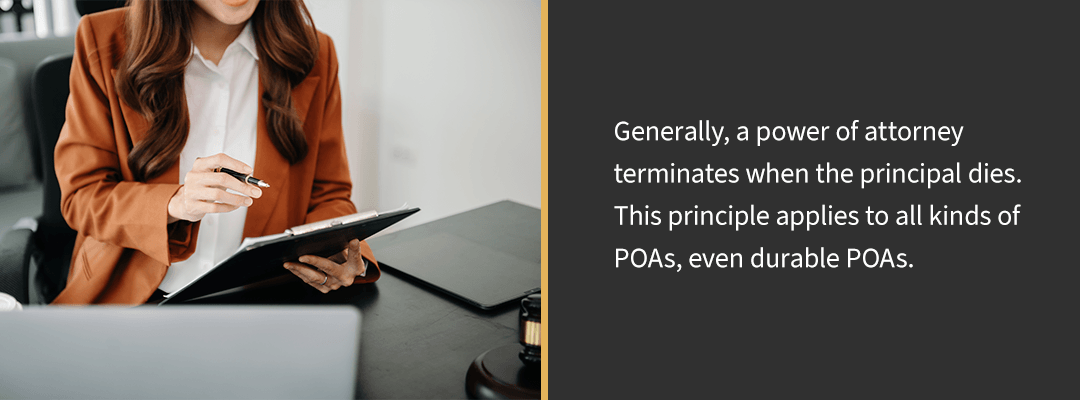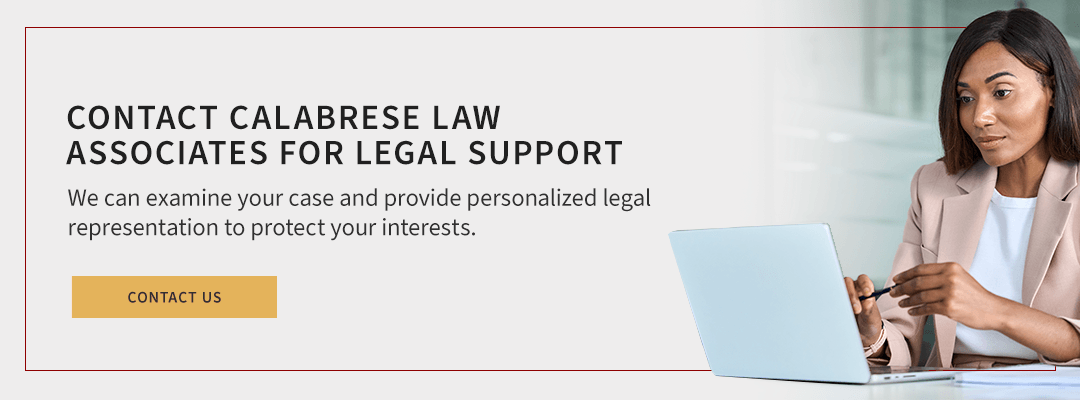Does a durable power of attorney (POA) end at death? If yes, what should you do when a loved one dies after executing a power of attorney during their lifetime? The legal principles surrounding POAs can be complex and confusing to many people. Considering their potential implications, it’s crucial to understand how they work.
The lawyers at Calabrese Law Associates can help you understand your rights, responsibilities, and liabilities regarding a POA. We can help you navigate the complex legal challenges and protect your interests.
This guide will teach you whether a power of attorney is valid after death, what to do when the person passes away, and the reason for POAs in estate planning.
What Is a Power of Attorney?
A power of attorney is a legal document that authorizes an individual to act on behalf of another. The creator of the POA is called the principal, while the authorized individual is called the agent or attorney-in-fact. To execute the document, they must sign a written draft, sometimes before a notary. Once the principal executes the POA, the agent is empowered to act in the principal’s capacity according to the terms of the document.
Typically, the agent must present a power of attorney document to demonstrate that they have the authority to perform the activity or transaction in question. For example, assuming the agent wants to access funds in a bank account, the bank may demand proof of authority — the POA. However, there are exceptions to the general rule.
POAs can be helpful in many cases. For instance, if the principal travels or is ill, they can authorize another individual to act for them. While there are no special qualifications when choosing an agent, it’s best the principal selects a trusted and reliable individual. In most cases, people choose family members, like their spouse or child, to act as the agent.
The Types of Power of Attorney
The principal may give the agent general or broad powers or limit the power to a particular activity, such as selling a property. A POA could also be durable or springing:
- General: As the name suggests, a general power of attorney gives the agent broad powers. In other words, the language of the documents provides little or no limitations in terms of what the agent can do concerning the subject matter.
- Limited: Contrary to a general power of attorney, a limited power of attorney is restricted to specified activities. Generally, the agent must act in the specified capacity to bind the principal.
- Durable: This type of power of attorney allows the agent to continue acting if the principal suffers from a physical or mental incapacity. A durable power of attorney could be general or limited according to the principal’s wishes at the time they execute the document.
- Springing: This type of power of attorney comes into effect when a specified event occurs. For example, the principal may insert a clause that triggers the POA if they develop a mental disability.
Limitations of Power of Attorney
While POAs grant agents legal authority to act on behalf of principals, there are some limitations. Generally, the agent cannot do the following:
- Use the POA to distribute the principal’s estate when they die.
- Use the POA to change the principal’s will.
- Act outside the principal’s best interest.
- Take compensation beyond what is outlined in the document or agreed between the principal and the agent.
- Unilaterally change the terms in the POA.
- Continue acting when the principal revokes the POA.
- Continue acting once the POA terminates.
Note that the list provided above is not exhaustive.
Does a Power of Attorney End at Death?
Generally, a power of attorney terminates when the principal dies. This principle applies to all kinds of POAs, even durable POAs. An exception could be when the agent acts in good faith without actual notice of the principal’s death. In such situations, the agent’s action binds the principal’s successors in interest unless the act is otherwise invalid or unenforceable. Actual notice means the agent is aware or should reasonably have known of the event.
Whether or not the agent had actual notice of the principal’s death is a question of fact. This means the surrounding circumstances would determine whether the agent knew or should have known of the principal’s demise. This situation can complicate the case, so it’s best to consult an experienced attorney.
Can a Power of Attorney Use a Bank Account After Death?
Generally, an agent cannot use the POA to access the principal’s bank account after the principal’s death. Once the principal dies, the assets become part of their estate. If the principal dies testate or with a will, the will typically dictates how the assets should be distributed. If the principal dies intestate or without a will, the Massachusetts law of intestacy will determine how to distribute the estate.
What to Do When the Principal of a Power of Attorney Dies
In cases where the principal dies testate, the executor named in the will administers the estate. Conversely, if the principal died intestate, administrators will administer the estate.
When the principal dies, the executor or administrator must file for probate to transfer the assets to the principal’s beneficiaries. There are different types of probate for various situations, so it’s best to consult an attorney to know which one you must file. However, the beneficiary may avoid probate in some instances, such as when the property is subject to a trust or joint tenancy.
The Importance of Power of Attorney in Estate Planning
A person can use a POA to help manage their affairs if they cannot do it alone. For example, a principal with a physical disability can leverage a POA to transfer assets to beneficiaries. This strategy can help the beneficiary avoid the costly and time-consuming probate process when the principal dies. POAs can ensure continuity in managing the principal’s assets and affairs, especially in the event of physical or mental incapacity. Considering the complexity and sensitivity of such situations, it’s advisable to consult an attorney.
Why Trust Us?
At Calabrese Law Associates, we provide practical legal solutions to our clients. We aim to help you solve your most pressing legal needs and form a long-lasting relationship. Our team of experienced attorneys listens and dedicates time to reviewing the case. This strategy allows us to offer tailored advice and representation. We genuinely believe all cases are unique and deserve special attention.
Our ethical and effective services have won us several awards in Massachusetts. Our guiding principles include providing excellent services to achieve the best possible results. We are honest, transparent and direct in our approach. Our clients benefit from our friendly staff, who are ready to guide you through the legal hurdles. You can read our reviews and testimonials to learn more about us.
Contact Calabrese Law Associates for Legal Support
Calabrese Law Associates handles cases involving estate administration and POAs. We can examine your case and provide personalized legal representation to protect your interests. Do you want to learn more about the effects of a power of attorney after death or need help? Contact us now!
This publication and its contents are not to be construed as legal advice nor a recommendation to you as to how to proceed. Please consult with a local licensed attorney directly before taking any action that could have legal consequences. This publication and its content do not create an attorney-client relationship and are being provided for general informational purposes only.
Attorney Advertising. Prior results do not guarantee a similar outcome.





